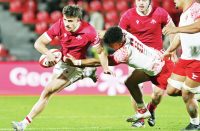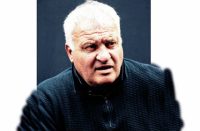 Olly Kohn has no intention of ending up as cannon-fodder for any bright sparks on Brain of Britain or University Challenge even if he can imagine the question: Your starter for ten – who won a Six Nations‘ gold medal in seven minutes and was never seen again?
Olly Kohn has no intention of ending up as cannon-fodder for any bright sparks on Brain of Britain or University Challenge even if he can imagine the question: Your starter for ten – who won a Six Nations‘ gold medal in seven minutes and was never seen again?
The first player to be discovered by Wales via Twitter, Kohn is already unusual enough without becoming a contender for the shortest international career on record. The Welsh management had been oblivious to the Bristolian’s cross-border ancestry until a tweet from a team-mate at Harlequins.
The news that he qualified came as manna from heaven for Wales at a time when almost their entire stock of locks had been rendered hors de combat. Five were out of commission. A sixth, Ian Evans, had not played since November.
Wales took a gamble on rushing Evans straight in for the start of the Six Nations, alongside the uncapped Andrew Coombs with Kohn on the bench. He got there because his late grandfather, David Lewis, came from Fleur de Lys in the Rhymney Valley.
The super-heavyweight Quin appeared for the last seven minutes of the opening lost cause against Ireland. He finished in one piece before, ironically, the newest Welsh lock joined the other second row crocks by pulling a hamstring in training the following week. It cost him the prospect of a second outing off the bench in Paris before the limping and the lame began to return to action.
Kohn duly dropped off the radar and when they switched the lights off at the Millennium Stadium before the trophy presentation, the fans would have been left in the dark as the vanishing Harlequin climbed onto the podium.
The organisers having made it clear that anyone who played a part, no matter how small, was entitled to a medal, Kohn received his in his ‘corporate suit’ with a few more from the supporting cast like other one-off subs, Lou Reed and Ryan Bevington.
“I never expected to be there,” Kohn said. “But then I never expected to be launching my international career at the age of 31. It was an incredible honour, one which gave me a massive sense of pride to be part of the Welsh campaign.
“I just wish I could have contributed a bit more. I’d love to have played more of part and hopefully I’ll have the chance to do that. Those of us who had played in the Championship were told before the England match that in the event of Wales winning the title, we were to be up on the podium. I loved the whole experience even if it was a little surreal.
“It was an emotional day for my mum and the rest of the family. They were all there, blubbing in the stand. They knew what it would have meant to my grandfather if only he had lived to see it.
“The medal will take pride of place among the things I’ve won. I’ll keep it in a safe place until my son Jude is old enough for his dad to start boring him about the day he played for Wales. Now that I’ve got the taste, I’d love to get some more and maybe be involved in the summer tour to Japan.”
To mark Wales’ achievement, Kohn is in the process of producing a special Six Nations whopper in his role as marketing director of the family’s Jolly Hog and Sausage Company.
“We’re looking at two possibilities – a pork and leek sausage or a Caerphilly cheese one,” he says. “It’s at the developmental stage.”
At seven minutes, Kohn’s Test career is already three times longer than the three shortest. Former Brumbies and Ulster full back-cum-wing Mark Bartholomeusz had to settle for two minutes 33 seconds against Italy in 2002.
Two others didn’t get that long. Sean McCahill, whose brother Bernie played for the All Blacks, was limited to fewer than two minutes for Ireland, as a temporary replacement for Maurice Field against Fiji in November 1995. Mathieu Dourthe made a similarly fleeting appearance for France against the All Blacks at Marseille 13 years ago.
Enough to make Kohn sound a veteran by comparison …
One Comment
Leave a Comment
You must be logged in to post a comment.























Pingback: Water Heater Repair Plumbers